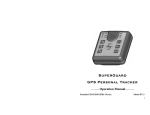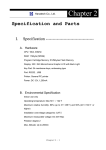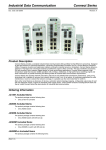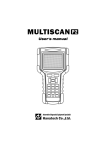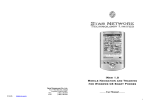Download APM PT-3 User's Manual
Transcript
Thank you for purchasing the SuperGuard Personal Communication and Tracking device. Please read all instructions carefully before operation, to ensure your complete understanding and to obtain the best possible performance from the unit. Warranty The Yield Technology Co., Ltd. (YTC) warrants to the purchaser that this product, under normal use and conditions, will be free from defects in materials and workmanship for a period of 12 months from the date of original purchase. If a product proves defective during this warranty period, YTC, at its option, either will repair the defective product without charge for parts and labor, or will provide an exchange for the defective product. In order to obtain service under this warranty, the purchaser must notify YTC of the defect before the expiration of the warranty period and make suitable arrangements for the performance of service. The purchaser shall be responsible for appropriate packaging and shipping with a carrier designated by YTC, with shipping charges paid by recipient (YTC). This warranty shall not apply to any defect, failure or damage caused by improper use or improper or inadequate maintenance and care, alterations, mishandling or accidents. YTC shall not be obligated to furnish service under this warranty to costs incurred for installation, to correction of antenna problems, removal or reinstallation or to damage to video tapes, discs, speakers, accessories or vehicle electrical system. The extend of YTC’s liability under this warranty is limited to the repair or replacement provided above and, in no event, shall the company’s liability exceed the purchase price paid for this product. THIS WARRANTY IS GIVEN BY YTC IN LIEU OF ANY OTHER WARRANTIES, EXPRESS OR IMPLIED. YTC AND ITS VENDORS DISCLAIM ANY IMPLIED WARRANTIES OF MERCHANTABILITY OR FITNESS FOR A PARTICULAR PURPOSE. YTC’S RESPONSIBILITY TO REPAIR OR REPLACE DEFECTIVE PRODUCTS IS THE SOLE AND EXCLUSIVE REMEDY PROVIDED TO THE PURCHASER FOR BREACH OF THIS WARRANTY. YTC AND ITS VENDORS WILL NOT BE LIABLE FOR ANY INDIRECT, SPECIAL, INCIDENTAL OR CONSEQUENTIAL DAMAGES IRRESPECTIVE OF WHETHER YTC OR THE VENDOR HAS ADVANCE NOTICE OF THE POSSIBILITY OF SUCH DAMAGES. 2 Notices ¾ To decrease the influence of electromagnetic interference, please use the device properly. The SAR standard value is 1.6W/Kg, and the result of testing the product is: 0.322 W/Kg. (Note: Mobile phone modules are free from testing and SAR label). ¾ Do not touch the battery charger connector with any metal objects such as coins or key rings to avoid the danger of short circuit. ¾ Do not dispose of the battery in fire. ¾ Do not put the battery in your mouth. Unintentionally swallowing the battery may result in poisoning. ¾ Do not try to disassemble the product or accessories. ¾ The product has a built-in battery, which can only be replaced or changed by qualified technicians or authorized service personnel. Using an improper type of battery may result in explosion. Follow the manufacturer's instructions to dispose of the used batteries. ¾ Use of other batteries, DC adapter, car charger (optional) or desktop charger (optional) not specified by the manufacturer may result in possible danger. ¾ Under normal operation or charging, the handset may become warm or hot. ¾ Use an anti-static cloth to clean the product. Do not use any dry cloth or materials, which generate static electricity. ¾ Do not use chemical cleaning agents or cleaning agents with grinding components. It might scratch the surface of the outer casing. ¾ Recycle the cardboard and other packaging materials for environmental protection. Flight Security Notes Turn off the product on board an airplane or within the flight security range. Using mobile phones in an airplane is illegal and may endanger flight security. IPSs may reject services due to misuse of product, violation of law or offense against public security. Do not use the product in the airport unless permitted by airport personnel. General Security Notices ¾ Turn off the product according to the instructions on two-way radio device security rules in vicinity of oil storage, chemical storage, or explosive substances. ¾ Tiny parts in the package should be placed out of reach of children to avoid accidents. ¾ Operating the product may affect the functionality of medical devices and equipment such as hearing aids or pacemakers. Follow the warnings and manufacturer's recommendations. 3 Automobiles with Air Bags Do not place any object (including fixed or handheld wireless devices) in the effective range of air bags because huge air pressure may result in harm. If the wireless device is not properly installed, it may cause serious damage or injury when the air bags are inflated. Table of Contents 1. 2. page 8 Preparations page 10 4. LED Status Description page 11 5. Getting Started page 12 Phone Operation page 13 6. Make a Phone Call Receive Incoming Calls 7. Sending a Location Update page 14 Power On/ Off 8. Active SOS and A911 Call page 15 A911 Emergency Response Function Users cannot repair or replace any part in the product, battery, or charger. It is strongly recommended that you should return the product to service centers authorized by YTC for service or maintenance. For more information, consult YTC or your distributors. 9. Effective Use 11. 4 Personal Tracker - Features 3. Service and Maintenance To enhance performance and reduce power consumption the product is built with embedded antenna. Do not cover any part of the antenna to maintain superior talking performance. To cover the antenna causes greater power consumption, this reduces talking time and standby time. page 6 Introducing GPS Security Notices During Driving ¾ Always drive with full concentration. ¾ Follow the local traffic rules and regulations. ¾ Use a headset or hands-free device to receive or place phone calls during driving. ¾ Do not park on a shoulder for calling except in emergencies. ¾ Turn off the product when entering a gas station. ¾ Do not put the product near combustible objects, explosive substances, or radio transmitters. ¾ Generally the electronic systems in car such as anti-lock braking system, active cruise control, and fuel injection system are not influenced by radio transmission. Manufacturers for the mentioned systems or devices provide you with information on antielectromagnetic interruption function. If you have any question or doubt about radio transmission influence, consult your distributor. ¾ Unauthorized personnel should not open or disassemble the product. Parts & Accessories 10. SOS Emergency Calls page 17 Alarm Report Features page 18 Geo-Fence Alarms Maximum Speed Alarms Locating and Tracking page 20 Quick Locator Get Detailed Locations Online Tracking 10. Technical Specifications page 23 5 1. Parts & Accessories On receipt of your Personal Tracker package, please check that all contents are complete and correct. 1 This manual covers SuperGuard Personal Tracker model PT-3. The PT-3 combines Global Positioning System (GPS) technology and GSM/GPRS mobile communication with online tracking and remote setup features. All SuperGuard products can be managed and monitored over Control Base and Tracking System Server software or online over Internet Websites provided by professional service centers. SOS Emergency Dual-Button Speaker Battery Status LEDs Status LEDs Geo-Fence Button 2 Power Button Speed Dial Buttons Microphone Built-in patch antenna 3 1. SuperGuard Personal Tracker PT-3 Unit 2. Rechargeable Battery 3. Charger 6 Magnetic Charger Connector The following chapters describe the Personal Tracker in detail and help you familiarize yourself with functions and features. Read the manual carefully before you use the Personal Tracker. 7 2. Personal Tracker – Features Introducing GPS: The SuperGuard Personal Tracker is working in combination with an advanced GPS tracking system. It helps you determine your location, enable preset contacts to track your position any time, and place SOS calls in case of emergency. The Personal Tracker is easy to configure through GPRS and SMS over Internet or GPRS and 3G enabled cell phones, user-friendly, and especially convenient for monitoring children, elderly and business travelers. ¾ The Personal Tracker is designed as a compact, waterproof, mobile GPS tracking device with cellular phone features. It can memorize three preset numbers for quick dialing. You can use the Personal Tracker to place phone calls or receive incoming calls from any caller. ¾ The Personal Tracker employs a patented Active SOS feature. In case its owner falls down, a G-Force or Impact alarm will be triggered. In addition, an automatic phone call will be placed to the main contact person, with 3-way call option to include other persons in the phone conversation. ¾ The Personal tracker comes with a dual SOS button designed for emergency calls. Pressing both buttons at the same time will trigger an alarm message to Control Base and up to 3 authorized contact numbers. In addition, an automatic phone call will be placed to the main contact person. ¾ Users are able to setup and configure device settings, monitoring activities and alerts online, using Control Base software or Tracking Web services via Internet Explorer or mobile on GPRS enabled cell phones. ¾ Authorized contact persons can locate and track users per 2-RING call, SMS and online maps over Internet Website or GPRS cell phones. ¾ Users can define and load up to 4 restricted areas (Geo-Fence areas) to the device and setup maximum speed limit alerts. 8 Global Positioning System (GPS) is a global radio navigation system, which consists of 24 MEO satellites and stations on the earth. A GPS receiver built in the device calculates your location and altitude via the signal from satellite. Based on triangulation of signals of at least three of the satellites, it applies a “Pseudo ranging” technique to calculate the transmission time of the radio signal from the satellite in order to measure the distance of each satellite, and then pinpoint the current location. GPS Satellites emit two types of radio signals, “C/A” (Coarse/Acquisition) and “P” (Precision). The latter one is preserved for military use and requires decryption. Like other commercial GPS appliances, the Personal tracker uses “C/A” signal to pinpoint location and altitude. Likewise, the display accuracy of location will depend on varied factors, which include time. Please note that those variations are fundamental characteristics of GPS, it doesn’t indicate any malfunction of the mini tracker. The following situations may affect accuracy of GPS: 1. 2. 3. 4. 5. Narrow alley between tall buildings in built up area. Indoors Bad weather Under shelter In tunnels 6. Inside a car with metal heat insulation. (We suggest avoid use near metal heat insulation while you are using the personal tracker in the car.) 9 3. Preparations 4. LED Status Description In order to use the Personal Tracker, the following preparations should be carried out: Prepare one operational GSM SIM card. Make sure that the SIM card can operate without PIN protection and has GPRS with unrestricted Internet access enabled (ask your GSM operator for APN and GPRS dial up requirements). Empty the SMS storage of the SIM card using operational GSM phone (please refer your GSM phone manual to do this). Press the Power (INFO) button for 3 seconds to shut down the device. 1. Remove the back cover of the Personal tracker by pressing up the battery release lock and push the cover sideways. 2. Disconnect and remove the battery. Insert the SIM card into the SIM holder in the direction as shown in picture. 3. Place the battery in the compartment and reconnect it. 4. Replace the cover and let it snap in completely. Press the Power button to power up the device. 10 X Y X Battery Power Indicators: ¾ If H LED flashes: Device is powered on, with fully charged battery ¾ If M LED flashes: Battery power is medium ¾ If L LED flashes: Battery power is low ¾ If all LEDs are flashing in sequence: Battery is charging Y Operational Indicators ¾ If GPS LED flashes: Device has GPS lock ¾ If GSM LED flashes: Device is registered to GSM network, able to send/ receive SMS and place or receive phone calls ¾ If GSM LED stays on for a period of time: Device is busy or searching for available GSM network ¾ If GPRS LED goes on: Device is dialing GPRS service. If connected, LED will flash several times if connection to Control Base was successful. Will repeat if not successful. ¾ When SOS buttons are pressed for 2 seconds, all LEDs will flash repeatedly and simultaneously. 11 5. Getting Started After closing the battery cover, the Personal Tracker will power up and automatically attempt to register to GSM network. Provided that your device is positioned in an area with clear un-obstructed view of the sky, the device will start scanning for GPS satellites to obtain its first GPS lock. This first fix can take several minutes. Your device has been preconfigured with Control Base server information from factory. Five minutes after first power up, the device will automatically attempt to connect to the Control Base in order to activate your user account and send first position and status details. To use all communication and tracking features of the device and if your service plan provides these, you may modify optional account information and device setup parameters from the Tracking Websites. Please refer to your Tracking Web or software guide to do additional account and device configurations. The following additional user information and device configurations can be setup from the Tracking Websites (amongst others): c User Name: This name will appear to identify the device when you receive GPS location and alarm notifications d Contact 1, 2, 3: Phone numbers of authorized contact persons to remote control security features and receive alarm notifications. e Geo-Fence: You can load up to 4 restricted areas (Geo-fences) to the device and receive alarm notifications in case of violations f Speed Limit: You can define a speed limit to receive alarm notifications in case of exceeding. g Power Saving Modes: To save battery power, you can configure your device with different power saving modes. 12 6. Phone Operation The Personal Tracker allows you to receive and accept phone calls and quick-dial to three preset phone numbers (contact numbers). Make a Phone Call Select and press the button for the contact number you want to call. (You will have to setup contact numbers through your online Tracking Web and load to the device prior to operation). Send / Hang-up Press the Send button to quick-dial to the contact number you have selected. To end a call, press the Send button or any of the Contact number buttons again. Contact Numbers 1, 2, 3 Receive Incoming Calls Press the Send button or any of the Contact number buttons to accept an incoming phone call. To end the call, press the Send button or any of the Contact number buttons. Receive Call / Hang-up NOTE: The Personal Tracker’s first 8 seconds of ring time (ca. 2-4 rings) are reserved for the Single Location Request function. The ring tone will only be audible at the device after this period. 13 7. Sending a Location Update 8. Active SOS and A911 Call (Patent pending) The Personal Tracker comes with an INFO button that allows you to send your current GPS position to the Control Base and all contact persons. INFO button to send location details Press the INFO button to send a request with your current position to the Control Base. The Personal Tracker comes with a three-level G-Force detector that is able to automatically register falls and high-velocity impacts. If Active SOS is enabled, the device will send an automatic emergency call when a person is falling down (especially applicable for elderly people). In addition, it will send an automatic emergency call when a person is exposed to a high-velocity impact (as might be the case in car accidents). The device will send a message and GPS coordinates to the Control Base. The Control Base software will find the street name and closest intersection from a map server and send these details through SMS short messages to all Contact numbers, with the text (example): The device will send an alarm message and GPS coordinates to the Control Base. The Control Base software will find the street name and closest intersection from a map server and send these details through SMS short messages to all Contact numbers, with the text (example): Robert is in Madison Ave, near intersection Brixton Rd.; Man Down ! The Personal Tracker will then automatically dial a phone call to main Contact number. The INFO button is also used to power the device on or off. A911 Call: A third party, medical emergency or police can be added to the call in order to hold a 3-way conversation. To do this, the contact person who took the SOS call simply dials the number of the third party while the SOS call is still connected. The device will dial to the third party instantly. To power off the device, press the INFO button and hold for 3 seconds. Press again to turn the device on. NOTE: 3-way call features may not be supported by all GSM operators. Please ask your operator for details. Robert is in Madison Ave, near intersection Brixton Rd.; Request ! Power On/ Off 14 To end the SOS call, press SEND or any of the Contact numbers on the device. 15 9. SOS Emergency Calls A911 Emergency Response Function: The Personal Tracker comes with two SOS emergency buttons, which shall be pressed simultaneously to notify contact persons about current location and place an emergency call. During the call, Contact dials number of 3rd party or police Y An automatic phone call is placed to the Contact person Z All three parties can talk \ Press the dual SOS button to trigger the emergency call. Apart from sending location details and alarm notification to all contact numbers, the A911 Call feature allows three parties to attend the conversation at the same time. [ The Device places a second call to the 3rd party The device will send an alarm message and GPS coordinates to the Control Base. The Control Base software will find the street name and closest intersection from a map server and send these details through SMS short messages to all Contact numbers, with the text (example): Robert is in Madison Ave, near intersection Brixton Rd.; SOS ! X The Personal Tracker will then automatically dial a phone call to main Contact number. A third party, medical emergency or police can be added to the call in order to hold a 3-way conversation. To do this, the contact person who took the SOS call simply dials the number of the third party while the SOS call is still connected. The device will dial to the third party instantly. Device owner falls down or presses SOS emergency button NOTE: 3-way call features may not be supported by all GSM operators. Please ask your operator for details. 16 Press both SOS buttons simultaneously to trigger emergency call To end the SOS call, press SEND or any of the Contact numbers on the device. 17 10. Alarm Report Features You can use your Personal Tracker as an alarm reporting device. With the built-in Geo-fence function you can create a 200 meter Parking Geo-fence around the device. If the device leaves the area, an alarm report will be triggered. Geo-Fence Alarms ¾ If the device has been configured with a set of restricted geographic areas (Fixed Geo-Fences), the following activities will be triggered when a Geo-Fence violation occurs: SET button to setup Geo-Fence Robert is in Arlington., near intersection Fairfax Ramp; GEO Fence Violation ! Press the SET button to set a 200 m Geo-fence around the device. The device will send an alarm message and GPS coordinates to the Control Base. The Control Base software will find the street name and closest intersection from a map server and send these details through SMS short messages to all Contact numbers, with the text (example): Robert is in Madison Ave, near intersection Brixton Rd.; Geo-Fence Violation ! In addition, you are able to setup and configure a number of monitoring activities and alerts to the Personal Tracker, using Tracking Web services via Internet Explorer or mobile on GPRS enabled cell phones. 18 The Personal Tracker will send an alarm message and GPS coordinates to the Control Base. The Control Base software will find the street name and closest intersection from a map server and send these details through SMS short messages to the list of authorized Contact persons, with the text: The Geo-Fence alert with location updates will continue every 60 minutes in case the device still remains in the restricted area. Maximum Speed Alarms ¾ If the device has been configured with a maximum speed limit, the following activities will be triggered when the moving speed exceeds the speed limit: The Personal Tracker will send an alarm message and GPS coordinates to the Control Base. The Control Base software will find the street name and closest intersection from a map server and send these details through SMS short messages to all Contact numbers, with the text: Robert is in Highway 166, near intersection Gleebe; Speeding 19 11. Locating and Tracking NOTE: Only the Contact Numbers and Control Base will be able to send location and tracking commands. Using other cell phones or dial-up software to send commands to the unit will have no effect on the Device. $GET,1 ¾ To setup reference points and receive current positions and directions directly from the Personal Tracker, authorized Contact persons can configure and label up to 5 GPS location points: From your GSM phone, use SMS text message to configure the device with a local time zone, used for Quick Locator function (example for GMT +2 hours): $TIME,02 Robert is 36 km SW of OFFICE. Speed: 58 km/h, 19:45:23, 08-07 $SET,1,OFFICE Î Enter Personal Tracker Number Î Send The Device will set the current GPS position as reference point 1, labeled “OFFICE”. 20 with the meaning: “Robert is 36 km South West of reference point OFFICE. His current speed is 58 km/h at 19:45:23 hours, date: August 7th “. Get Detailed Locations ¾ To receive detailed location information from the device or Control Base, do the following: From one of the contact numbers, place a call to the device and let it ring. Hang up after 4-5 seconds (ca. 2 rings). Dial Call to Personal Tracker Î 2 Rings ÎHang Up Î Enter Personal Tracker Number Î Send From your GSM phone, use SMS text message to setup a reference point at the current location of the device (example for point number 1; do accordingly for points 2 ~ 5): Î Enter Vehicle Unit Number Î Send You will receive an SMS from the device shortly (example): Authorized users can interrogate the Personal Tracker to receive locations, street names and details. If present, they can poll and track devices through Control Base software or Tracking Web services via Internet Explorer or mobile on GPRS enabled cell phones. Quick Locator To poll the distance and direction of the device from a preset reference point, use the GSM cell phone to send SMS text message (example for reference point number 1): The device will go GPRS online and send it’s latest GPS position to the Control Base. The Control Base software will find the street name and closest intersection from a map server and send these details through SMS text message to you. As an option, if the device’s first attempt to dial GPRS failed for any reason, the GPS data will be sent to the Control Base through SMS instead. In that case, you will receive location details sent from the Control Base directly (backup feature). 21 10. Technical Specifications NOTE: To send location requests from authorized Contact numbers, you will need to enable Caller ID features on your cell phone. Online Tracking ¾ By default, the Personal Tracker will send position updates to the Control Base server over GPRS in 5-Minute intervals. ¾ From the Control Base software, over Internet from the Tracking Website or GPRS enabled cell phones, you will be able to see latest position updates and display them on a map. You can view Tracking history and results over unlimited time. ¾ If your service plan allows it, from the Control Base or Websites, you are also able to setup Tracking schedules for periods up to 45 days, in intervals between 30 seconds and 17 hours. ¾ You can start and end tracking your devices in real-time, following its route on a map (GPRS connection and network coverage required). ¾ You can setup and modify device configurations, define Geo-Fence areas and speed limits. You will also be able to configure sleeping modes for the GPS engine to reduce power consumption. 22 General The unit utilizes GPS to receive time, date, longitude, latitude, speed, direction data; GPRS for data exchange with Control Base and GSM for communication and short messaging. GSM GSM/GPRS module Sim340 module GSM 850 MHZ GSM 900 MHz (2 watt) Class 4 GSM 1800 MHz (1 watt) Class 1 GSM 1900 MHZ GSM Antenna Built-in GPS GPS module L1, C/A code receiver, 12 channels Protocol NMEA-0183 V3.0, proprietary iTALK binary protocol GPS Antenna Active Patch antenna Accuracy 10m-20m Update rate Speed/Accuracy Max 30sec. Configurable. Default setting 120 Second Cold start: 44sec Hot start: 3sec (Open Sky) 0.2 M/sec. (50%) Acceleration Max: 4g Start time 23 Max Height 18,000 M Sensitivity -158 dBW Datum Coordinate WGS-84 Electrical Operating Voltage 3.6V Charge Voltage 6-8V Stand by Pico Power Operating 80mA Talk 100mA Battery Motorola 998 1500 mAh Operating time: >8h, Talk time: 3h, Standby time: 100h Others Operating temperature -10℃ to +50℃ Dimensions 55 x 61 x 24 mm Speaker (Built-in) 32Ohm/0.5W Microphone (Built-in) 58db 24 25















